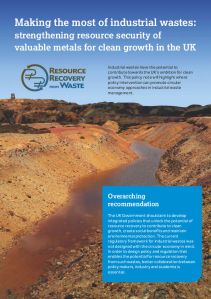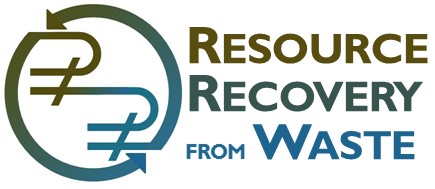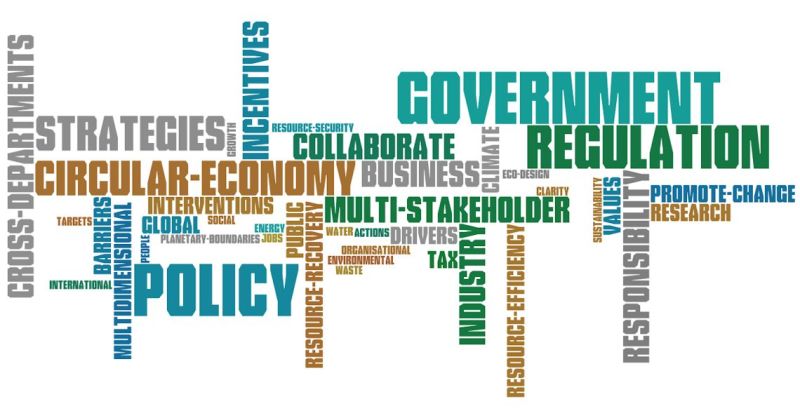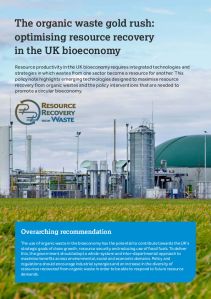Drawing on 5 years of research, RRfW has pulled together their work on recovering resources from industrial waste to highlight where changes in policy are necessary in order to promote circular economy approaches in industrial waste management.
RRfW policy and practice notes
The organic waste gold rush: optimising resource recovery in the UK bioeconomy
The use of organic waste in the bioeconomy has the potential to contribute towards the UK’s strategic goals of clean growth, resource security and reducing use of fossil fuels. While the reduction of avoidable organic waste remains a priority, a number of waste streams are likely to persist and could provide a significant feedstock for the UK bioeconomy. The greatest environmental, social and economic benefits of resource recovery from organic wastes are associated with the displacement of fossil fuel derived chemicals and materials, and the combined products of nutrients and energy from anaerobic digestion. Organic wastes offer multiple resources that can be exploited most efficiently by technologies working in synergy with each other. Investments into different options for using organic wastes are driven by government policy and resource demand, in addition to technology readiness. Policy and regulations should encourage industrial synergies and an increase in the diversity of resources recovered from organic waste in order to be able to respond to future resource demands.
Making the most of industrial wastes: strengthening resource security of valuable metals for clean growth in the UK.
 Industrial wastes from the mining and manufacturing sectors contain metals such as vanadium, cobalt, lithium and rare-earth elements. Many of these are currently 100% imported and also necessary for clean technologies including wind turbines, solar panels, energy storage and a multitude of electronics. Recovering these resources from industrial wastes has the potential to contribute towards the UK’s ambition for clean growth, resource security and reducing carbon emissions. However, the current regulatory framework for industrial wastes was not designed with the circular economy in mind and policies will need to become more integrated in order to unlock the potential of resource recovery to contribute to clean growth, create social benefits and maintain environmental protection.
Industrial wastes from the mining and manufacturing sectors contain metals such as vanadium, cobalt, lithium and rare-earth elements. Many of these are currently 100% imported and also necessary for clean technologies including wind turbines, solar panels, energy storage and a multitude of electronics. Recovering these resources from industrial wastes has the potential to contribute towards the UK’s ambition for clean growth, resource security and reducing carbon emissions. However, the current regulatory framework for industrial wastes was not designed with the circular economy in mind and policies will need to become more integrated in order to unlock the potential of resource recovery to contribute to clean growth, create social benefits and maintain environmental protection.
Overarching policy recommendations
The RRfW programme has assessed the political and regulatory challenges to adopting new resource recovery technologies, processes and systems. Despite clear benefits being put forward by multiple industrial, commercial and governmental commentators, transition remains slow and the current policy landscape is a major barrier to adoption of resource recovery. RRfW makes four overarching policy recommendations to overcome these barriers covering the following areas:
- Integrate assessment of multi-dimensional costs and benefits into decision making
- Collect data on stocks and flows of material quantity and quality
- Launch an Office for Resource Stewardship to coordinate government action
- Knowledge, skills and infrastructure for a circular economy
The recommendations are outlined in full on pages 38-39 of the RRfW end-of-programme brochure. We also provide an expanded summary of these recommendations in our blog Policy change needed to support uptake of resource recovery technology.
Responses to consultations
RRfW response to Policy Connect’s Energy from Waste evidence call Resource Recovery from Waste 2020. This evidence submission was in response to the Policy Connect’s cross-party inquiry into the future of Energy from Waste The final report from the inquiry is now available: No Time to Waste: Resources, recovery & the road to net-zero
Our Waste, Our Resources: A Strategy for England – A response from Resource Recovery from Waste (RRfW) research programme Purnell, P. and Velenturf, A. 2019, Resource Recovery from Waste. For an overview of this response, please see our blog
Response to Environmental Audit Commission’s electronic waste and the circular economy inquiry by RRfW. Published on the Electronic waste and the Circular Economy inquiry webpage on 3 September 2019.
Response to the 25 Year Environment Plan Indicator Framework Consultation by RRfW.
Policy briefing event
A Strategy for Valuing Resources and Wastes – using HM Treasury Green Book approach
28 November, 16.00 – 18.00 hrs, Houses of Parliament, London
A joint event was held by the All-Party Parliamentary Sustainable Resource Group and the Resource Recovery from Waste’ programme, aimed at strengthening dialogue between academia, industry and policy-makers, and build consensus on the value of resources and waste in delivering UK strategic aims of ‘clean growth with prosperity for all’.
A common theme that has emerged from the diverse projects within the RRfW programme is the need to incorporate multi-dimensional value (economic, social and environmental) into government decision-making. Experts from the Resource Recovery from Waste programme, policy and industry will introduce why multi-dimensional value is key to delivering the transition to a Circular Economy. Policy makers from Defra, BEIS and Treasury will share their perspectives on how environmental and societal values are currently incorporated into decision-making in resource management, energy and infrastructure spending, and discuss if these approaches go far enough?
The event was chaired by Alan Whitehead MP, and speakers included Prof. Andrew Brown, Prof. Phil Purnell, Nick Molho and a panel of policy and economic representatives from BEIS, Defra and Treasury.
For an event summary, please see our blog: A strategy for valuing resources: incorporating environmental, social and economic value.
Policy impact project
Policy work by the RRfW programme was in part funded by an additional NERC Policy Impact Award, for further details please see our policy impact project page.


